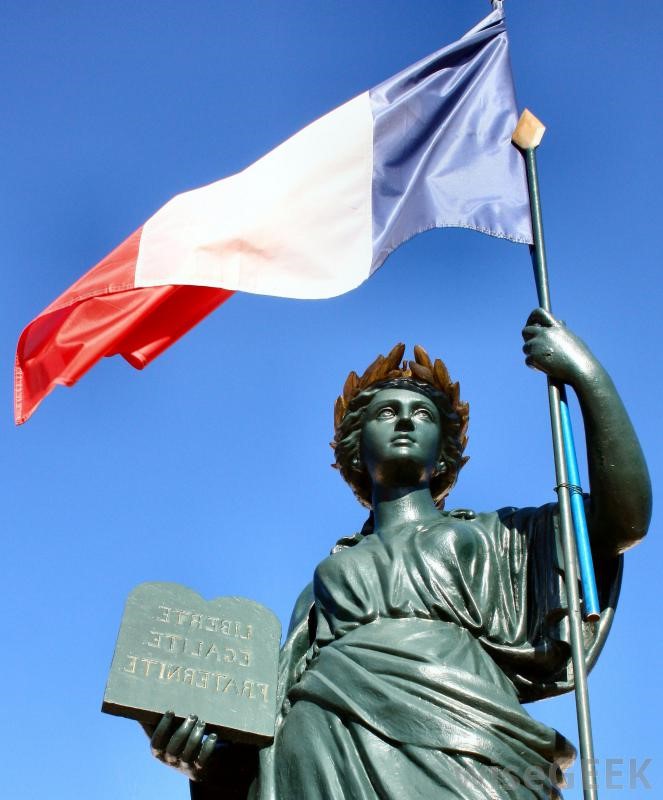
On July 14, 1789, a Parisian street mob stormed the Bastille, a state prison that symbolized the oppressive regime of King Louis XVI.
Today is Bastille Day, the French version of America’s Fourth of July. It commemorates the beginning of the French Revolution.
The French ardently admired what the American colonists had accomplished in their revolt against Great Britain the previous decade. There were great hopes on both sides of the Atlantic that a new wave of revolutions would overthrow tyranny in all its forms around the world.
But the French Revolution, as it played out over the next quarter century, took one dark turn after another. It quickly became clear that the Spirit of 89 was different from the Spirit of 76.
Whereas America has become arguably the most religious nation in the West over the past 200-plus years, France has arguably become the least.
Groups of French radicals vied with their rivals for control of the emerging new order. The Revolution became self-destructive. The status quo sometimes changed overnight. The king and queen were tried and executed. Tens of thousands of politically suspect citizens went to their deaths during the Reign of Terror. Maximilien Robespierre, who had orchestrated the Terror, was himself arrested and sent to the guillotine within 24 hours.
Along the way the French sought to throw off the shackles of everything that seemed to stand against the revolutionary core values of Liberty, Equality, and Fraternity.
Since the Church had traditionally provided support to the royal court and to wealthy aristocrats, most of the revolutionaries were eager to cast it aside.
Thus began what historians have called the “radical dechristianization” of France.
Churches became public property. Priests were relieved of their duties. Most were given a choice: either join the Revolution or go to the guillotine. More than 1,400 streets in Paris were renamed in an effort to erase any memory of the Catholic saints.
On November 10, 1793, the most famous place of worship in France, the Cathedral of Notre Dame, was renamed the Temple of Reason. A popular opera star portrayed Liberty. Robed in white, she bowed to the flame of Reason at the very spot where Christ had been worshipped for over 600 years.
But this grand religious (or anti-religious) experiment didn’t work out quite as the radicals expected.
Returning to the words of British author G.K. Chesterton, which we quoted earlier this summer: “When a man stops believing in God he doesn’t then believe in nothing. He believes in anything.”
The French Revolution needed a center. A final source of truth. They anticipated that Reason would fit the bill. But history reveals, sadly, that Reason was quickly dethroned by the revolutionaries.
To quote Pete Townshend of The Who: Here’s to the new boss, same as the old boss. The Revolution unleashed tyrannies that rivalled anything the world had seen before. Historians agree that the ultimate legacy of what happened in France was the elevation of the Nation or some version of a New Humanity to the center of everything.
And from there it was only a short journey to the State-is-Always-Right miseries of the 20th century, starring Hitler, Stalin, Mao, Pol Pot and their imitators.
The Hebrew prophets never budged an inch as to who they thought ruled the cosmos. “Remember what happened long ago, for I am God, and there is no other. I am God, and there is none like me” (Isaiah 47:8).
You don’t have to be a student of history or politics or revolutions to know that it matters who or what we think occupies life’s center. When people say, with revolutionary flourish, “I’m in charge of my own life, and from now on I’m going to follow my own truth and my own wisdom” – storming the Bastille of their parents’ constraints or society’s traditions – they’re actually reading a very old script. And they will discover soon enough that putting Me at the center of everything leads to even deeper disruption and disappointment.
Bastille Day remains a mid-summer opportunity for the French to shoot fireworks, sip wine, and savor croissants that are so much better than the ones at your local grocery.
But it’s worth noting that the French philosopher Voltaire, who died in 1788 – just one year before the Revolution he helped inspire – once remarked that Christianity would no longer be taken seriously 100 years after his death.
By 1888 his own estate had become, in part, a Bible distribution center.
That’s an irony that would no doubt have made even Voltaire smile.
